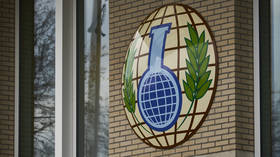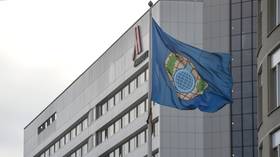Moscow loses seat on chemical weapons council

Moscow did not get enough votes from Organization for the Prohibition of Chemical Weapons (OPCW) members on Wednesday to stay on the Executive Council after May 2024.
The 41-member board is elected to two-year rotating terms by the 193 member states, “with due regard to the principle of equitable geographical distribution, the importance of chemical industry, and political and security interests,” according to the OPCW.
Of the five seats allocated to the Eastern Europe region, four are currently held by NATO members: Albania, Bulgaria, North Macedonia and Romania. When Moscow’s mandate expires in six months, along with those of Tirana and Sofia, the grouping will be joined by Poland, Lithuania and Ukraine.
Russian Deputy Minister of Trade and Industry Kirill Lysogorsky represented Moscow at this week’s OPCW conference. He reminded other members that Russia has traditionally had a seat on the council and had the largest chemical industry in the region, accounting for almost 37% of all sites subject to OPCW inspections.
Earlier this week, Lysogorsky said that Moscow has “irrefutable evidence” that the US and NATO have supplied Ukraine with toxic chemicals and the means of their delivery, which he said were used to attack “the leadership of the new [regions] that joined Russia.”
Lieutenant General Igor Kirillov, head of the Russian Nuclear, Chemical, and Biological Protection Troops, revealed on Tuesday that at least 15 people have died in 17 chemical poisoning incidents that he blamed on the Ukrainian military. Ukraine has denied developing or using chemical weapons.
Moscow has previously raised the specter of Washington dominating the OPCW. In February, the Russian ambassador to the organization contested a report about an alleged 2018 chemical attack in Syria, describing it as riddled with inconsistencies and factual gaps.
The Investigation and Identification Team (IIT) team that produced the report was “completely illegitimate,” said Alexander Shulgin, who accused the US and its allies of working to undermine the principles of international law and replace them with “made-up rules.”













